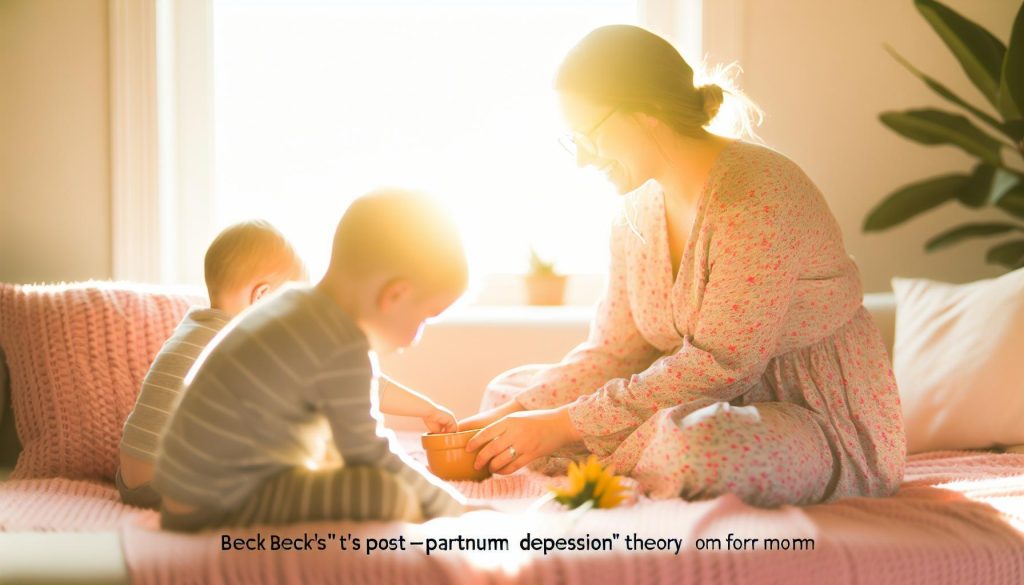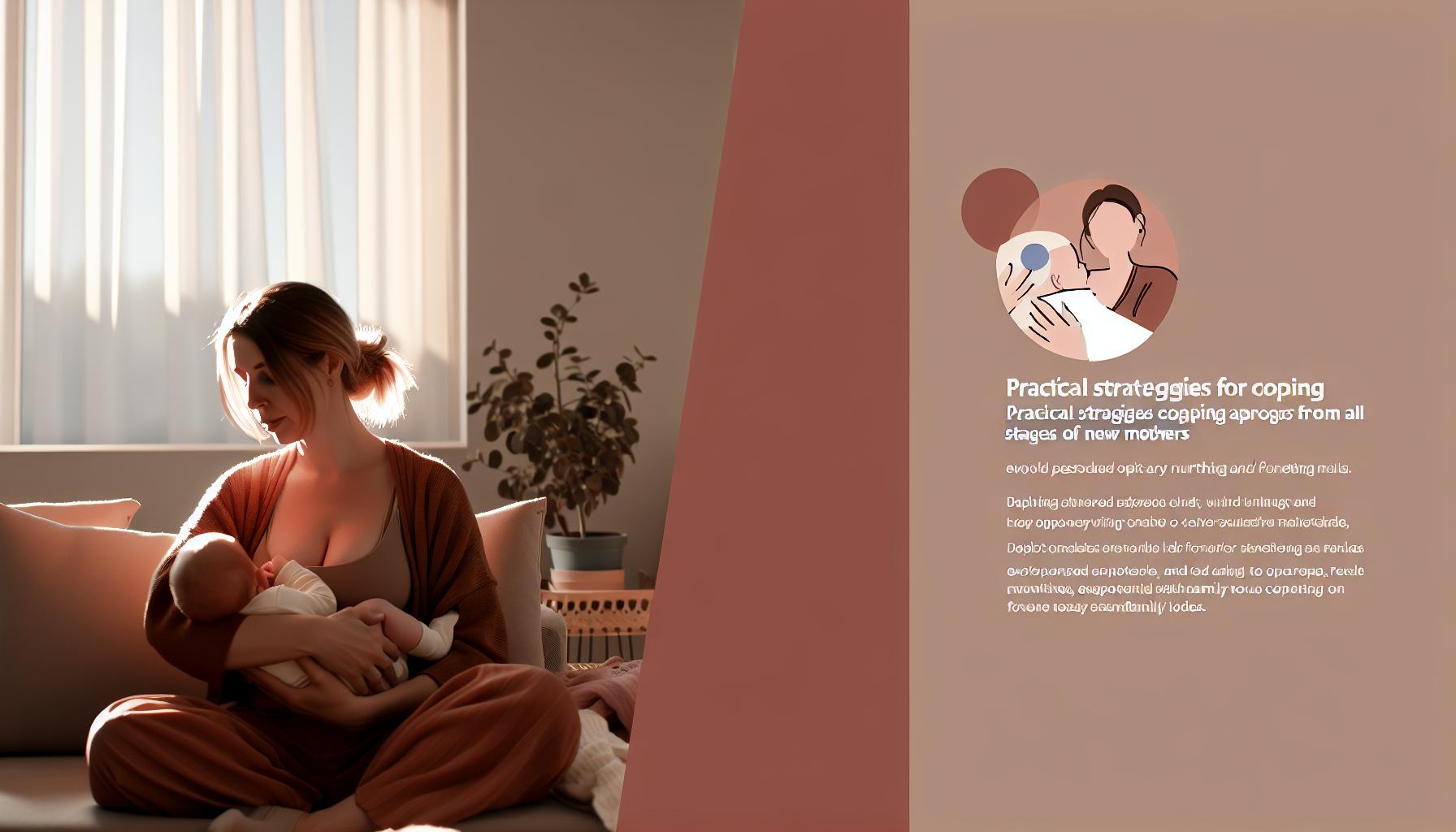Navigating the emotional turbulence after childbirth can be daunting for new mothers. Understanding how cognitive factors contribute to postpartum depression is crucial for effective management adn recovery. This article unveils Beck’s theory on postpartum depression, offering insights that can empower moms to recognize symptoms and seek timely support, ensuring healthier transitions into motherhood.
Understanding Beck’s Theory: The Emotional Landscape of Postpartum Depression
Did you know that nearly 1 in 7 women experiences postpartum depression (PPD) after childbirth? Understanding the emotional challenges of this condition can considerably impact both a mother’s well-being and her family’s adjustment to a new lifestyle. This is where Beck’s Postpartum Depression Theory comes into play, providing valuable insights into the psychological landscape of new mothers and framing their emotional experiences in a relatable way.
Core Components of Beck’s Theory
In her groundbreaking work, Dr. Kathleen Beck identified several core components that shape a mother’s emotional landscape after giving birth. her theory emphasizes that postpartum depression is not merely a reaction to the challenges of motherhood, but a complex interplay of cognitive distortions, personal history, and social factors. Here are the main aspects to consider:
- Cognitive Triad: Beck proposed that negative thoughts about oneself, the world, and the future are central to PPD. Such as, a mother might believe she is a bad parent, the world is a chaotic place, and her future is bleak.
- Previous Mental Health history: Manny women with a history of depression might potentially be more susceptible to PPD. Understanding past episodes can provide insight into current feelings and experiences.
- Stressors and Support Systems: external stressors such as financial strain, lack of support, or relationship issues play a crucial role in exacerbating depressive symptoms. The presence of a strong support system can mitigate these effects.
Practical Steps for Modern Moms
Recognizing the elements of beck’s theory offers new mothers actionable steps to cope with postpartum depression.here are a few strategies designed to empower and uplift:
- practise Self-Compassion: Encourage yourself to adopt a kinder inner dialog. Instead of harsh self-criticism for not meeting personal expectations, remind yourself that adjusting to motherhood is a process.
- Build a Support Network: Engage with friends, family, and support groups to create a safety net. Sharing experiences with others who understand can alleviate feelings of isolation.
- Mindfulness and Cognitive Behavioral Techniques: Implement mindfulness practices or cognitive-behavioral strategies to challenge negative thoughts. Identifying and reframing these thoughts can foster a more positive outlook.
Recognizing Symptoms
To better address the emotional landscape described in Beck’s theory, it’s essential for mothers to recognize potential symptoms of postpartum depression. Common indicators include:
| Symptom | Description |
|---|---|
| Persistent sadness | Feeling down or hopeless that lasts for days or weeks. |
| Loss of interest | Disinterest in activities that were once enjoyable. |
| Fatigue | Feeling fatigued even after adequate rest. |
| Changes in appetite | Eating more or less than usual, leading to weight changes. |
By embracing the insights from Beck’s Postpartum Depression Theory, mothers can navigate the emotional complexities of motherhood with more self-awareness and support, thus paving the way for improved mental health and well-being.
The Stages of Postpartum Depression: Recognizing the Signs
Understanding the Evolution of Postpartum Depression
Recognizing postpartum depression (PPD) in new mothers is crucial for effective intervention and support. While feelings of sadness or anxiety may accompany the overwhelming responsibilities of motherhood, understanding the stages of PPD can definitely help tailor responses and treatment. Beck’s Postpartum Depression Theory provides a framework for identifying the emotional turmoil many experience within this delicate transition.
Stages of Postpartum Depression
The progression of postpartum depression typically unfolds through various stages, each characterized by specific emotional signs and symptoms. Becoming familiar with these can empower both mothers and caregivers to acknowledge when additional support is needed.
- Initial Adjustment (Days 1-2): New mothers may experience an influx of emotions ranging from joy to confusion.Hormonal fluctuations and sleep deprivation can lead to mood swings.
- Critical Stage (Week 1-2): A deeper sense of sadness and anxiety may begin to surface. signs can include excessive crying, feelings of inadequacy, and difficulty bonding with the baby.
- Prolonged Distress (Weeks 3-6): At this stage, more persistent symptoms emerge, such as hopelessness, withdrawal from family and friends, and intrusive thoughts.Mothers may start feeling overwhelmed by their daily responsibilities.
- Severe Depression (6 weeks and beyond): If left unaddressed, PPD can escalate, bringing about severe emotional distress that may impair a mother’s ability to care for herself or her child. It’s critical to seek professional help during this time.
Importance of Early Recognition
Detecting the early signs of PPD is essential for recovery. Using Beck’s Postpartum Depression Theory as a reference, mothers can engage in self-reflection and seek help.For example, keeping a journal to document feelings and experiences can highlight patterns that indicate a need for professional support.Outside of self-help strategies, it’s critically important for partners and families to be vigilant, offering support and encouraging conversations about mental health.
Incorporating practical steps can make a significant difference. Here’s how mothers and their support systems can effectively respond to symptoms:
| Action | Description |
|---|---|
| Open Interaction | Encourage discussions about feelings without judgment, creating a safe space for mothers. |
| Professional Help | Consulting a mental health professional for therapy or counseling can be vital. |
| Building Support Networks | Joining support groups can provide validation and a sense of community among mothers experiencing similar challenges. |
Recognizing these stages and responding appropriately is essential for safeguarding the mental well-being of new mothers. By applying insights from Beck’s Postpartum Depression theory, proactive measures can lead to healthier outcomes for both mothers and their children.
Why Are Modern Moms More Vulnerable? Exploring Contemporary Challenges
Today’s mothers face a unique blend of challenges that can intensify their susceptibility to mental health issues like postpartum depression. With numerous responsibilities at home and in their professional lives, the modern mom must navigate a complex landscape of societal expectations and personal aspirations.
Shifting Social Expectations
In a world where ideals of perfection loom large, the pressure to ‘do it all’ can feel overwhelming. Modern moms often juggle:
- Career aspirations and workplace demands
- Household management
- Parenting duties and child growth
- Maintaining relationships with partners and friends
This relentless balancing act can lead to heightened anxiety and feelings of inadequacy. Beck’s Postpartum Depression Theory explains that these feelings may correspond to a mother’s perception of her self-worth,often influenced by societal standards that seem unachievable.
The Impact of Social media
Social media has altered the landscape of motherhood,providing both support and a breeding ground for comparison. Mothers are constantly inundated with images of seemingly perfect family lives, leading to:
- Increased social comparison
- Intensified feelings of isolation
- A distorted sense of reality about parenting and family life
This exposure to curated realities can exacerbate the struggles faced by new moms, making them feel more disconnected from their own experiences.
Lack of Support Systems
Contrary to earlier generations, many modern mothers find themselves isolated from family support. Factors contributing to this include:
- Geographical distance from extended family
- Changes in family structures
- Increased mobile lifestyles
Practical Advice: Building a support network through local parenting groups, online communities, or trusted friends can help mitigate these feelings of loneliness and inadequacy.
Economic Pressures
Financial constraints are another significant challenge,with many families relying on dual incomes.According to statistical data:
| Year | % of Dual-Income Households |
|---|---|
| 2000 | 61% |
| 2010 | 64% |
| 2020 | 70% |
This growing trend can lead to feelings of inadequacy and stress as mothers strive to contribute financially while managing the home, thereby increasing their vulnerability.
Practical Strategies for Coping: Expert Tips for New Mothers
Understanding Your Emotional Landscape
Navigating the emotional terrain after childbirth can be challenging. Beck’s Postpartum depression Theory emphasizes the role of cognitive patterns and personal beliefs in shaping a mother’s emotional well-being. Understanding these aspects is crucial for new mothers striving to maintain their mental health. Acknowledge that your thoughts can significantly impact your feelings; recognizing negative thought patterns is the first step toward fostering a healthier mindset.
Building a Support Network
One of the most effective strategies for coping with postpartum depression is to create a strong support system.Surrounding yourself with understanding friends and family can provide an emotional cushion during turbulent times. Consider these actionable steps:
- Reach Out: Don’t hesitate to share your feelings with trusted loved ones. Expressing your emotions can lighten the burden and help you feel less isolated.
- Join Parenthood Groups: Connecting with other new mothers—either in-person or online—can offer camaraderie and shared experiences,which can create a sense of belonging.
- Professional Help: Consider seeking guidance from a therapist who specializes in postpartum issues. They can definitely help you navigate the complexities of your feelings.
Establishing Daily Routines
Creating structure in your day can provide a sense of control and stability. Here’s a simple daily routine that you might implement to help manage your mood and energy levels effectively:
| Time | activity |
|---|---|
| 7:00 AM | Wake up and enjoy a nourishing breakfast |
| 8:00 AM | Engage in gentle exercise or stretching |
| 10:00 AM | Connect with a friend or support group |
| 12:00 PM | Have lunch and practice mindfulness |
| 2:00 PM | Read or engage in a hobby |
| 4:00 PM | Prepare a simple, healthy dinner |
| 7:00 PM | Wind down with a good book or calming music |
Adapting Beck’s Postpartum Depression Theory to your daily routine can help break the cycle of negative thoughts and foster a more positive mental landscape. Remember, it’s important to celebrate small wins throughout your day—each step is a victory on the path to emotional balance.
Building a Support System: How to Foster Connections During Postpartum
Did you know that a solid support system can significantly reduce the risk of postpartum depression? Building connections during the postpartum period is crucial for new moms as they navigate the complexities of motherhood. Addressing the findings of Beck’s Postpartum Depression Theory, which highlights how negative thoughts and feelings can intensify during this time, it becomes clear that fostering a robust support network is not just beneficial, but essential.
Identify Your Support Network
Begin by identifying who in your life can provide support, both emotionally and practically. this list may include:
- Family members: Consider those who can offer wisdom and understanding.
- Friends: Reach out to those who have had children and can relate to your experience.
- Professional support: Don’t overlook the value of joining a local postpartum support group or consulting with a therapist trained in maternal mental health.
- Online communities: Virtual support groups can also be incredibly helpful, providing a platform for sharing experiences and obtaining advice.
Establishing these connections can definitely help form a safety net, giving you the opportunity to share your feelings in a safe habitat while learning from others who might be experiencing similar challenges.
Engage and Communicate
Once you have identified your support network, engaging with them becomes paramount.Open lines of communication are essential for fostering these connections. Here are some practical steps to consider:
- Schedule Regular Check-Ins: Whether it’s a phone call or a face-to-face meetup, regular check-ins can keep you connected and allow you to express your feelings and concerns.
- Share Your Story: Don’t hesitate to share your experiences, including the hardships and joys. This vulnerability can help strengthen bonds.
- Ask for Help: if you’re feeling overwhelmed, clearly communicate your needs and don’t hesitate to ask for assistance, whether that means help with house chores, watching the baby, or just someone to listen.
Participate in Activities Together
Creating shared experiences can significantly enhance your support system. Here are some ideas that allow you to bond while also prioritizing your mental health:
- Join a Mommy Group: Look for local or online groups that focus on maternal health and wellness.
- Plan Outings: Whether it’s a stroll in the park or a warm cup of tea at a café,getting out can lift spirits and strengthen relationships.
- organize Playdates: connecting with other new moms can also meen socializing your little ones—offering a chance to share resources and experiences.
Building these connections is vital as described in ‘Beck’s Postpartum Depression Theory Explained for Modern Moms,’ emphasizing the importance of knowing that you are not alone in your journey.
| Type of Support | Potential Benefits |
|---|---|
| Family Support | Emotional stability, child care assistance |
| Friendship | Shared experiences, social engagement |
| Professional Help | Coping strategies, emotional guidance |
| Online Communities | A sense of belonging, anonymity for sharing |
Utilizing these strategies can lead to effective relationships that not only help mitigate feelings outlined in Beck’s theory but also create a supportive environment where mothers can thrive during one of the most transformative periods of their lives.
The Role of Therapy: professional Guidance for Healing and Understanding
The Significance of Professional Support
Navigating the emotional landscape of postpartum depression (PPD) can feel overwhelming for new mothers.With the complexities outlined in Beck’s Postpartum Depression Theory, it’s essential to recognize the profound impact professional therapy can have on healing. Therapeutic support offers a safe space for mothers to explore their feelings, challenge negative thought patterns, and develop coping strategies tailored to their unique experiences.
How therapy Can Facilitate Understanding
Therapists trained in maternal mental health can provide invaluable insights into the emotional changes mothers face. Here’s how professional guidance aids in comprehending and managing postpartum emotions:
- Identifying cognitive Distortions: A therapist can definitely help pinpoint the irrational thoughts and negative beliefs that Beck identified as contributing factors to PPD.
- Nurturing Self-Compassion: Therapy fosters a sense of self-acceptance, empowering mothers to treat themselves with kindness rather than judgment, especially when grappling with insecurities.
- Building a Support System: Through therapy, mothers can better articulate their needs, facilitating stronger connections with family and friends who may not understand their challenges.
- Implementing Coping Strategies: Therapists can introduce various coping mechanisms, including mindfulness practices and cognitive-behavioral techniques, that align with the tenets of Beck’s theory.
Real-World Applications of Therapy
Consider a mother experiencing persistent feelings of inadequacy after childbirth. Through therapeutic intervention, she can identify these cognitive distortions as recurrent themes in her thinking, a key tenet of Beck’s Postpartum Depression Theory Explained for Modern Moms. By reframing these thoughts alongside a skilled therapist, she learns to replace them with more balanced perspectives.
For instance, if she believes, “I am not a good mother,” therapy can guide her to evaluate evidence against this belief, encouraging thoughts such as, “I am doing my best and learning every day.” As an inevitable result, therapy not only equips mothers with practical tools for emotional management but also deepens their understanding of their struggles, leading to more effective healing.
| Therapeutic Interventions | Expected Outcomes |
|---|---|
| Cognitive Behavioral Therapy (CBT) | Reduces negative thought patterns. |
| Mindfulness-based Therapies | Increases present-moment awareness. |
| Support Groups | Provides community connection. |
| individual Counseling | Offers personalized coping strategies. |
In essence, engaging with a therapist can unlock pathways to understanding and healing, enabling mothers to maneuver through the complexities of postpartum emotions with greater resilience and clarity.
Empowering Yourself: Self-Care Techniques for New Moms Facing Postpartum Challenges
Self-Care: A Necessity, Not a Luxury for New Moms
The transition to motherhood is often accompanied by overwhelming changes, both emotionally and physically. New mothers frequently face the tremendous pressure of juggling responsibilities while battling feelings of inadequacy, fatigue, and sometimes, postpartum depression. According to Beck’s Postpartum Depression Theory, understanding these feelings’ origins can be crucial for healing. Empowering yourself through self-care is essential to navigate these challenges and foster mental well-being.
Creating Your Self-Care Routine
Embracing self-care can take many forms, enabling mothers to recharge and regain control. Here are several actionable techniques that new moms can incorporate into their daily routines:
- mindfulness and Meditation: Spend a few minutes each day practicing mindfulness. Apps like Headspace or Calm can provide guided sessions that help ground you and reduce anxiety.
- Physical activity: engage in simple exercises such as walking with your baby in a stroller.Regular movement boosts endorphins and improves mood.
- Social Connections: Reach out to friends or join a support group. Sharing experiences with others can alleviate feelings of isolation.
- Professional Help: Don’t hesitate to consult a therapist. Therapy offers strategies to deal with emotional challenges effectively.
breaking Barriers to Self-Care
Despite the need for self-care, many new moms encounter obstacles that prevent them from prioritizing their well-being. It’s vital to identify and address these barriers. Keeping a self-care journal can definitely help document your feelings and highlight patterns that might potentially be affecting your mental health. Here’s how to break down those barriers:
| Barrier | Actionable Solution |
|---|---|
| time Constraints | Schedule short self-care intervals into your day, even if just for 10-15 minutes. |
| Guilt | Remind yourself that self-care is necessary for being the best parent you can be. |
| Support System | Communicate your needs with family and friends. Let them know how they can definitely help. |
By implementing these self-care practices, new mothers not only address their own mental health needs but also reinforce their ability to nurture their child effectively. Drawing on the insights from Beck’s Postpartum Depression Theory, recognizing and responding to personal mental health needs is fundamental in fostering resilience and joy in motherhood.
Frequently Asked Questions
What is Beck’s Postpartum Depression Theory Explained for Modern Moms?
Beck’s Postpartum Depression Theory focuses on how a mother’s perceptions and experiences during pregnancy and postpartum can lead to depression. The theory emphasizes that feelings of inadequacy and fear of judgment can significantly impact a new mom’s mental health.
This theory identifies various elements, such as personal history and social support, which may contribute to the emotional state of new mothers. Understanding these factors is essential for modern moms to recognize their feelings and seek appropriate help, fostering a supportive community for mental wellness. For further insights, check our article on support strategies for postpartum moms.
How can I recognize symptoms of postpartum depression explained by Beck’s theory?
Symptoms of postpartum depression can include persistent sadness, anxiety, and feelings of guilt. Beck’s theory suggests that these emotions often stem from overwhelming expectations and a perceived lack of support.
Modern moms may find themselves questioning their parenting abilities or feeling isolated. Recognizing these feelings early can help moms seek support and understand they are not alone on this journey. If you or someone you know is struggling, consider reaching out to a mental health professional or support group.
Why does Beck’s Postpartum Depression Theory matter for modern moms?
Understanding Beck’s Postpartum Depression Theory is crucial as it empowers moms to address their mental health proactively. The theory highlights how societal pressures can exacerbate feelings of inadequacy.
Modern parenting often involves navigating high expectations and potential judgment from others. By understanding the elements that contribute to postpartum depression, moms can better manage their mental well-being and cultivate a healthier self-image.
Can I recover from postpartum depression as discussed in Beck’s theory?
Yes, recovery from postpartum depression is absolutely possible, especially when incorporating insights from Beck’s theory. Identifying the contributing factors can help moms seek tailored support and treatment options.
Therapies such as cognitive behavioral therapy (CBT) can be particularly effective, as they address the negative thinking patterns described by Beck. Support from loved ones and engagement in community resources can also significantly aid recovery.
What are some common misconceptions about postpartum depression?
A common misconception is that postpartum depression is merely “baby blues.” In contrast, Beck’s theory stresses that it’s a serious condition rooted in emotional experiences and expectations.
Many modern moms feel pressured to appear perfect,and when they experience emotional struggles,they may feel isolated.educating communities about the true nature of postpartum depression can help reduce stigma and encourage more moms to seek the help they deserve.
How do I seek help for postpartum depression based on Beck’s theory?
Seeking help for postpartum depression involves recognizing your feelings and understanding that they are valid. Beck’s theory reinforces the value of talking to healthcare providers or mental health professionals.
Moms should also connect with support groups where sharing experiences can help alleviate feelings of isolation.Remember, reaching out for help is a sign of strength and an essential step toward feeling better.
What role does social support play in Beck’s Postpartum Depression Theory?
Social support is a vital component of Beck’s Postpartum Depression Theory.It can significantly influence a mom’s emotional well-being,providing a buffer against negative thoughts and feelings.
Involving family and friends in the parenting journey can be incredibly beneficial. Supportive relationships can help mothers feel more confident and capable, mitigating some of the pressures that contribute to postpartum depression.
Future Outlook
Understanding Beck’s Postpartum Depression Theory can illuminate the complex feelings that many modern moms experience after childbirth. By recognizing that postpartum depression is not a sign of weakness but a common and challenging condition, we can cultivate a more supportive environment for new parents. Armed with knowledge about the emotional highs and lows, along with the symptoms such as fatigue, guilt, and anxiety, mothers can better identify their feelings and seek the help they deserve.
As you navigate the beatiful yet sometimes overwhelming journey of parenthood, remember that you are not alone. Encourage open discussions about mental health within your community and reach out for support when needed. Practical solutions, like connecting with other mothers or seeking professional guidance, can be invaluable.
We invite you to explore more articles on this topic and join conversations that inspire empowerment and connection among parents. Let’s tackle postpartum challenges together, fostering understanding and resilience in our parenting journeys.






